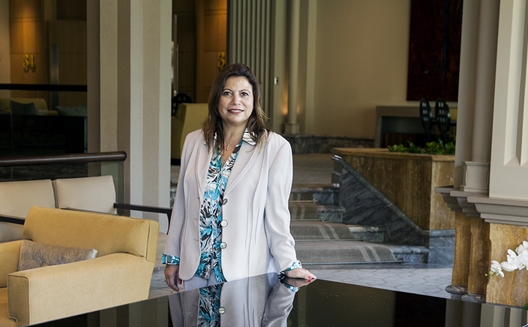From Egypt to the Gulf: conquering the HR market

Attracting good staff is the MENA-based entrepreneur’s constant lament, yet Egyptian Rania Abdallah says there are ways to solve this dilemma if you’ve a good strategy.
Despite statistics showing an increase in unemployment in the Arab world, entrepreneurs generally agree that this actually reflects a shortage of skills rather than a shortage of job opportunities.
Wamda spoke with Abdallah, founder of Aspire HR Consultants about how she’s built a successful company both by minding her own staff and teaching other businesses how to manage theirs.

Wamda: Is there a shortage of qualifications in the Arab market?
Rania Abdullah: Generally no. I don't see a direct shortage, but companies will face immense challenges in the future because of social, demographical and technical changes.
Wamda: Can you tell us about Aspire HRC?
Abdallah: We are a human resources consultancy.
We work with our clients on putting together a human resources strategy, measuring performance, restructuring tasks to increase efficiency, and doing technical, vocational and psychological assessments to help companies find the right people for managerial positions.
After four years in Egypt, we decided to expand, and we set up an office in the Gulf region (four years ago).
Wamda: Is working in the Gulf states easier?
Abdullah: Not at all. It can actually be more complicated when it comes to the ‘success equation’. They are markets full of foreign expertise and a good number of giant corporations. When you take into consideration the smaller population of the emirates as compared to Egypt (which has 90 million people), it gets harder to succeed.
Wamda: And how did you deal with this?
Abdullah: Winning the Emirates Businesswoman Award and being honored by Sheikh Ahmed Bin Saeed Al Maktoom had a great influence on gaining client trust in the Gulf.
Wamda: What differentiates Aspire HRC from other human resources companies in the region?
Abdullah: Since we are a regional human resources consultancy, it's not a coincidence that team harmony is one of our most competitive advantages. Integration and harmony are one of the important reasons behind the success of any company, regardless of its field or size of investment. We also build solid relationships with our partners, and they always seek us for follow-ups or new projects after we're done with our tasks.
One of the most important (differences between) Aspire HRC and local and regional competitors is the global partnerships we have. We represent IRC, ranked fourth in the world for human resources, in the Middle East region. This provides us with partnerships in 70 countries, which guarantees a wide diversity of experience.
On 'job assessment', we are partners with international company CEB, which specializes in technical, vocational and psychological assessments for employees through specialized tests. We also have a partnership with an American company for change management.
Wamda: What marketing channels have helped your company to succeed over that last eight years?
Abdullah: The shared success with our partners in reaching their target was the best marketing channel. It created word-of-mouth marketing which helped grow our customer base. We are a local company in a global environment and we must keep our eyes open for everything new.
Wamda: how did you succeed in running this consulting company?
Abdallah: I consider my 11-year-old position as human resources manager of Pepsico MENA to be one of the most important career stages of my life. I was responsible for running five branches in more than 35 countries, which gave me a clear vision of the different corporate needs in this sector. I also can’t overlook the efforts of the team at Aspire HRC, who are highly professional and who have long experience in consulting.
Wamda: What are your plans for expansion?
Abdullah: We've built long-term human resources strategies for more than a 100 companies so far and, by next year, we plan to add corporate training and development. We may also launch services relating to corporate social responsibility (CSR).
Wamda: When did your business model begin to mature, and did that coincide with your profit stability?
Rania Abdullah: After the first year of launching, we were sure of the local market need of human resources consulting services, and this definitely reflected on our profitability model.
Wamda: Tell us of the secret recipe for a successful work environment.
Abdullah: Diversity of the experience of the executive team, as well as task distribution. Employee tasks should be clear and they should not be too immersed in work and neglect their personal lives. This is to avoid psychological and family stresses. Companies should also grow their employees' entrepreneurial spirit, reaching a stage where everyone believes completely in the project at hand, so they can work clearly with a common goal.
Wamda: Why should entrepreneurs pay attention to their ‘human resources’?
Abdullah: Human resources are no less important than capital resources. That's why companies should pay attention to evaluation and assessment, as well as the fairness of salaries and offers, so they retain talent. Building employees' strengths and giving them the necessary tools for constant progress and adjustment to the environment is critical. It's essential to teach employees how to develop their own progress plan, and to listen to their feedback.


